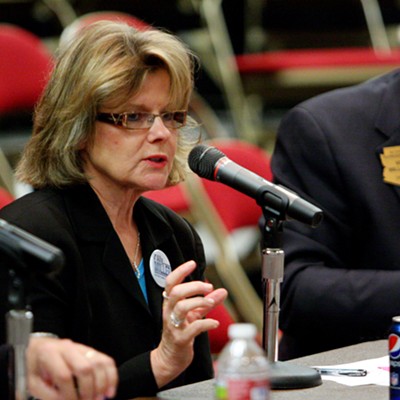And there's the amusing sideshow of watching the House Speaker Jake Flake clumsily swat at renegade Republicans Pete Hershberger and Tom O'Halleran.
But that's all obscuring the big job facing lawmakers: forging a state budget.
Gov. Janet Napolitano has proposed a $7.2 billion budget that includes mandated increases in education and health-care funding; raises for state employees; more money for universities; an increase in spending on day-care programs; and all-day kindergarten. To cover the new costs, Napolitano once again wants to shift some funds around, roll over some bills into the next fiscal year and borrow money to cover the costs of big-ticket items like school construction.
GOP lawmakers propose to spend roughly the same amount of money, but rather than borrow money to cover some of the costs, they freeze spending in most departments beyond the mandated increases in education and health care.
Although they're less generous than Napolitano, Republicans have abandoned last year's strategy of trying to deeply slash state spending--perhaps because that strategy turned into a public-relations nightmare, or perhaps because it's an election year, so they'd like to wrap up the session a little earlier this year.
Compared to recent years, when shortfalls forced mid-year cuts, there's actually good financial news at the Capitol: The state is doing better than expected halfway through the current fiscal year, which ends in June. The most recent report from the Joint Legislative Budget Committee, the number crunchers who monitor the state's finances, shows that revenues are about $120 million higher the original projections, and more than $233 million more than the same period last year.
The bad news: Mandated increases in education and health care, combined with climbing costs for prisons, mean the state is still facing what's being called the "structural deficit." Essentially, demands for state spending are still growing faster than revenues.
Education, for example, requires some $195 million in new spending; school construction is another $94 million; and health care requires an additional $285 million, according to Joint Legislative Budget Committee estimates.
State officials estimate that revenues will be only $6.9 billion, leaving a shortfall in the neighborhood of $300 million.
The ongoing structural deficit highlights problems in the state's tax structure. During her 2002 gubernatorial campaign, Napolitano promised to reform state's tax code; after she took office last year, she assembled the Citizens Finance Reform Commission to study ways to streamline the system.
The commission recently released a list of 36 recommendations to improve the tax structure. Among the suggestions: trimming property taxes on businesses, enacting a new property tax to build new schools, expanding the sales tax to include services now exempt such as haircuts and pet grooming, eliminating most corporate and personal tax credits, and reviewing current tax credits for donations to private schools. The group also suggested repealing the current constitutional requirement that any tax increase pass the Legislature by a two-thirds vote.
Napolitano has already announced she won't push for any of the tax reforms this year, but some lawmakers have introduced legislation that mirror a few of the recommendations, including cuts in business property taxes.
In general, Republicans have simpler ideas about tax reform. They've recycled two proposals that were shot down last year, both of which would require voter approval in November if they pass both the House and Senate.
First there's the "Taxpayer Bill of Rights" (House Concurrent Resolution 2032), which would limit budget growth to the rate of inflation, adjusted for population increases. The resolution has passed two House committees and is awaiting further action.
Then there's House Concurrent Resolution 2016, which would ask voters to limit their ability to raise taxes at the ballot box by requiring a two-thirds majority to raise any taxes. Given that few measures have ever crossed that hurdle, it would effectively lock in the current tax code forever.

















